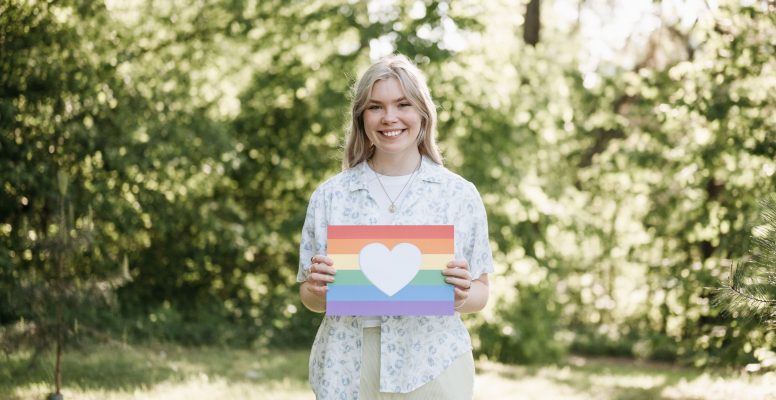
Heterosexual Privilege Awareness: Active Allyship
Written By: Anny Bae, Clinical Trainee at ACS, Outlet Program
WHAT IS PRIVILEGE?The concept of privilege refers to any automatic, unearned benefits and advantages awarded to members of dominant social groups, such as racial, gender, or sexual orientation identities (Case et al., 2012a; McIntosh, 1998). These privileges then operate on further intersecting identities (i.e., gay men versus lesbian women) that highlight the numerous power divisions between dominant and “subordinate” groups of people. These automatic, unearned benefits (or lack thereof) create group inequities that cause and perpetuate systems of disadvantage, oppression, and discrimination. Privilege and discrimination then become inseparable, codependent social systems that must be identified and understood in order to raise awareness and work towards ending the oppression of and discrimination against the underprivileged (Case et al., 2012a; Goodman, 2000).
Privilege Awareness
People from underprivileged or marginalized groups are more likely to be aware of privilege imbalances than those from privileged groups because they are more likely to be negatively affected by a variety of social, mental, economic consequences, which make unawareness nearly impossible. Though awareness of these unequal and oppressive systems are more easily recognized by those of the underprivileged social minority groups, it is the acknowledgement and acceptance of these systems by the privileged, dominant groups that are likely to promote allyship and ultimately assist in the needed breakdown of these structural forces (Case et al., 2012a; Goodman, 2000; Johnson, 2013). Putting sole responsibility for change on the already disadvantaged is unlikely to lead to the necessary changes in our society without aid from privileged others. This is because impactful change cannot be truly understood and implemented without focusing on and critically understanding privilege as a concept, which in turn will increase empathy and social justice motivation from those in power (Goodman, 2000; Powell et al., 2005).
Being an LGBTQIA+ Ally
Although great progress has been made towards equality on the basis of sexual orientation, there is still much discrimination and prejudice present in today’s American society that produce hostile attitudes and behaviors that negatively affect the well-being of the LGBTQIA+ population. These issues range from bullying and lack of an inclusive sexual education curriculum, to medical and mental healthcare and general treatment, as well as other discrepancies that highlight the lack of clear rights and protections for this underprivileged population. For example, a general social privilege heterosexual people have is that they do not have to announce their identity or “come out” because their orientation is the default and thus, already assumed. In contrast, non-heterosexual people typically go through a usually tumultuous process of self-scrutiny out of fear of rejection from their peers and loved ones. The need to announce their identity and the process of coming out may not even occur to heterosexual individuals, as the gravity and potential negative consequences are only focused on those that do not subscribe to the default. By being aware of this and other privileges, those who identify as heterosexual may be better at being able to recognize, understand, and accept the responsibilities that privilege brings. In the example of coming out, heterosexual people may be able to spread awareness of this inconsistency and learn to not deem heterosexuality as the dominant norm. This may give support and power to the underprivileged in order to attain active, equitable changes to existing power structures, such as not feeling the necessity to come out as non-heterosexual and just simply being.
_________________________
References
Case, K. A., Iuzzini, J., & Hopkins, M. (2012a). Systems of privilege: Intersections, awareness, and applications. Journal of Social Issues, 68, 1–10. doi.org/10.1111/j.1540-4560.2011.01732.x.
Goodman, D. J. (2000). Motivating people from privileged groups to support social justice. Teachers College Record, 102(6), 1061–1085. https://doi.org/10.1111/0161-4681.00092
Johnson, A. G. (2013). What can we do? In M. Adams, W. J. Blumenfeld, C. Castaneda, H. W. Hackman, M. L. Peters, & X. Zuniga, Readings for diversity and social justice (pp. 612-618). New York, NY: Routledge.
McIntosh, P. (1988). White privilege and male privilege: A personal account of coming to see correspondences through work in women’s studies. Working Paper No. 189. Wellesley, MA:Wellesley Centers for Women.
Powell, A. A., Branscombe, N. R., & Schmitt, M. T. (2005). Inequality as Ingroup Privilege or Outgroup Disadvantage: The Impact of Group Focus on Collective Guilt and Interracial Attitudes. Personality and Social Psychology Bulletin, 31(4), 508–521. https://doi.org/10.1177/0146167204271713
